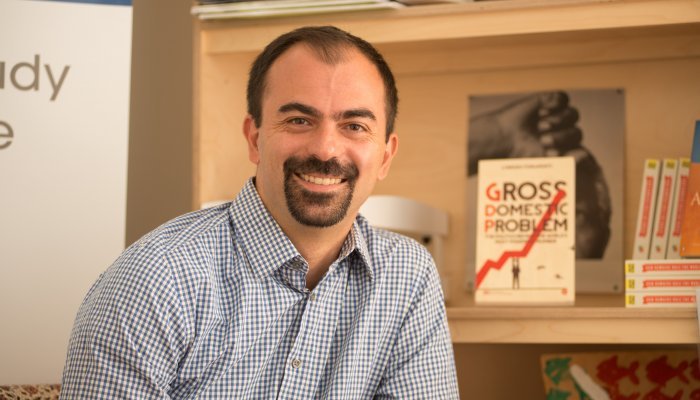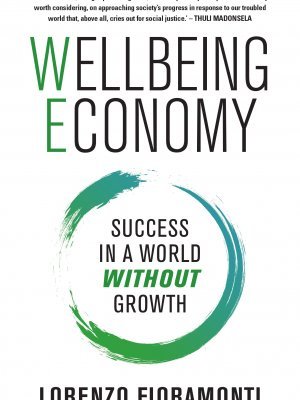Lorenzo Fioramonti believes that GDP growth, as it is measured through the gross domestic product (GDP), is wrong because it assumes that an economy will perform better by increasing the quantity of its transactions. Any transactions, anything we buy or consume. But this ignores the quality of those transactions, he says. As an example, he cites health.
“There is no reason why an economy that spends more on healthcare is better than one that spends less,” he says. “What counts is whether people are healthy: America owes 20% of its GDP to an expensive yet dysfunctional healthcare system. Costa Rica spends a fraction of that, but thanks to public health, its citizens are healthier. Which economy is better, adding that in the case of the latter, “maybe people stay healthy, eat properly and do exercise”?
With healthier people, the second example would have fewer transactions and therefore a lower GDP growth rate. But would we really want a much less healthy society even though its GDP growth rate was higher?
“Every time I get stuck in traffic, I’m spending resources like fuel to drive around. So, I’m increasing GDP, I’m increasing the economy. Crime, sickness, stress, environmental destruction: these phenomena require payments, because of security, treatment and pollution. But are they an indication of good performance?” asks Fioramonti rhetorically.
The burden of coal
An example he cites is plain to see in South Africa. “We are one of the world’s major producers of coal, but this mining activity has terrible environmental and social impacts. We lose billions of rand in lost productive capacity due to soil erosion, but we keep celebrating coal mines’ profits. We think we have gotten richer thanks to mining, but if you think of the social and environmental costs, then the story is quite different. We spend taxpayers’ money to rehabilitate the land, to look after the sick mineworkers and their families, and to clean up the polluted air and water. Ultimately, we may very well be worse off.”
Fioramonti believes that chasing GDP growth gives politicians and society the wrong incentives and with a different measure – one, for example, that counted the true costs of extractive industries to broader society – “communities would think twice before allowing companies to mine”.
His clear, straightforward explanation and examples are not easy to refute. But if that’s the case, why don’t more mainstream economists think his way and change the rules?
“We’re bombarded every day: if GDP goes up, we all think society will be better off,” says Fioramonti.
Wellbeing
“Economists know very well that GDP was never invented to measure progress or economic performance. It was only a measure of production. Many Nobel prize winners agree, including Joseph Stiglitz and Amartya Sen. They also admit that more GDP is perfectly compatible with people being worse off. But if more GDP doesn’t mean more wellbeing, why don’t we try and design policies that really increase wellbeing?”
Fioramonti’s ‘why’ is also quite straightforward: “Let’s face it, a lot of polluting industries have an interest in us believing that growth is the solution to our problems. They fund our universities and our research. Therefore, I’m not surprised that complacency has become so pervasive.”
A faint alarm bell rings and an image of Julia Roberts as Erin Brockovich drifts to mind. Does this mean that Fioramonti is anti-business?
“I’ve got nothing – nothing – against good business. I want to see people make good money. I want to see people thrive. I want to see people having long lives. But that doesn’t necessarily mean a higher GDP, especially in Africa, where our obsession with growth has meant quick and dirty destruction of all our ecosystems and the massive exploitation of our peoples.”
Italian-born Fioramonti is the founding director of UP’s Centre for the Study of Governance Innovation. He’s also a Senior Fellow at the University of Heidelberg and an Associate Fellow at the United Nations University. With that kind of pedigree, you might be forgiven for expecting his alternative to GDP to be complex and abstruse. Instead, it’s just called ‘wellbeing’ and in his American-accented English, Fioramonti admits that “it may sound Kumbaya and simplistic, but I think it speaks to what everybody understands.”
Everything costs
Fioramonti’s point of departure is that we – society – have to understand that “there is no way you can grow an economy at the expense of Mother Nature and society. Every time we destroy something, there is a loss. You can’t count that as a plus for growth”. At present, he says, “GDP gives to Mother Nature and its existence, a value of zero. So, anything else is better than leaving it intact. That gives us a wrong understanding of welfare and progress.”
His call is for measures that remind us “that everything out there, whether it’s Mother Nature or people, has a value in its own right. If we want to change or manipulate it, we should do so only if we can prove beyond any reasonable doubt that our change will improve things.”
Fioramonti is demanding full-cost accounting and regenerative development, which he believes will level the playing field between large corporations, which rely on overproduction and waste, and small enterprises, which are much more attuned to local needs.
By this measure, a coal-mining company would not only have to measure the cost of extracting the coal from the ground and getting it to market against the income from sales – traditional profit – but it would also have to add in costs like land rehabilitation, air pollution mitigation, damage done to public infrastructure like roads by heavy coal trucks, and the long-term cost of treating diseases suffered by miners and their families who live in the coal mine vicinity. Other victims of pollution from the mine would also have to be compensated. Only then would the real economic gain or loss be accurately measured. “As a consequence, many more businesses will have an incentive to shift away from extractive practices towards renewable energy, which is much more profitable once all dimensions are taken into account.” And what about mining? Fioramonti believes that full-cost accounting and regenerative approaches will promote a transition from mining natural deposits to ‘mining’ e-waste: “There is more gold in my phone than under the ground. We should rather mine landfills, thus producing value while reducing environmental impacts”.
Fioramonti notes that his approach to the ‘wellbeing economy’ builds on a very strong tradition of research in business practices, as well as ecological economics and political economy.
“I’m not pulling them it out of a hat. It’s hard science,” he argues. "Time has come for us to realise something that kids know very well – everything has a value. You can only build progress and prosperity through adding value, not by taking it away.”
The throwaway society
He also believes that part of the ‘sickness’, indeed maybe even its core, is consumerism, which encourages us in the continuous process of buying new things and throwing old ones away.
“Consumerism? There’s nothing natural in that, it’s incentivised by our policies,” states Fioramonti. “Governments subsidise the production of oil and coal because they believe it’s adding to growth. Then people consume more oil and coal because it’s made artificially cheap, outcompeting all alternatives. Thirty per cent of the food we produce is wasted. What kind of stupid system is this? We're destroying our environment and we don't even use what we produce, thus making a lot of people poorer and hungrier. There's a crazy economy out there, which instead is portrayed as an example of progress and development, with politicians rewarded for it.
“Every time we waste, every time we destroy, every time we throw away, our growth dial goes up. But if we build durable goods, reuse, and optimise the resources we have, then we are seen as underdeveloped. This is an insane system,” he concludes.
Insane it may well be, but there are a large number of people making even larger sums of money out of this system and therefore, they would have precious little incentive to change it.
“You’re right, but I’m just wondering – to paraphrase the singer Sting – whether they love their children too? Whether they do not realise that this system is self-destructive for them as well? When this ship sinks, everybody dies. The Titanic is a good example – many rich people died aboard the Titanic, too.”
Fioramonti asserts that he is “the most pro-business person on this planet. But I’m pro good business and I’m against bad business. We cannot continue subsidising the bad businesses, those that are destroying our planet and society for their own short-term benefits while outcompeting the good businesses.” He explains that “every time we believe that coal is good for the economy, we are outcompeting solar and wind and geothermal. We’re outcompeting the many innovative companies that are trying to generate more revenue with fewer costs and expenses for society. Good business is very interested in the idea of a wellbeing economy. They see value in showcasing positive practices.”
SA's anti-poor rules
The conversation ends – like Fioramonti’s book – on South Africa. Do we need a wellbeing economy as a way of preventing social conflagration caused by the country’s massive social inequalities?
Fioramonti is in no doubt: “Every single day I get more and more convinced that unless we change and do so quickly, we’re heading for a civil war. For more than 20 years, our policymakers have been promising the masses that there will be social justice and this hasn’t happened. Not because of a lack of social grants but because the fundamentals of our economy haven’t changed. The rules of the game are tilted in favour of big companies at the expense of small businesses and artisans. In favour of shopping malls at the expense of local markets and informal economic systems. In favour of large infrastructure at the expense of common resources and the environment. How can we expect to eradicate poverty in such a skewed system? We need more artisans, micro-enterprises and co-production of services at the community level, especially in rural areas, which have been abandoned by the growth economy. This means building a balanced economy, putting local economic empowerment at the core of the development strategy.”
The rules are designed for the poor to stay poor, he believes, and “only if we change the rules will we start levelling the playing field”.
That change of rules, says Fioramonti, means that rather than embracing GDP growth, we need to embrace the wellbeing economy.
He may well have a point.
“What counts is whether people are healthy...”
“...chasing GDP growth gives politicians and society the wrong incentives...”
“...unless we change and do so quickly, we’re heading for a civil war”






